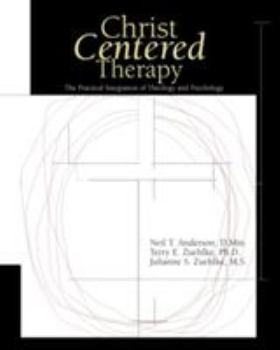Christ-Centered Therapy: The Practical Integration of Theology and Psychology
Select Format
Select Condition 
Book Overview
Depending on whom you ask, the term Christian counseling can mean anything from secular psychology practiced by a Christian to biblical counseling that completely shuns psychological insights. Christ-Centered Therapy thoroughly integrates psychology and practical theology. A book written by experts from both fields, it utilizes the contributions of science in an uncompromisingly biblical framework. Here at last is a powerful resource to help you--pastor, counselor, or spiritual advisor--understand the complex problems of people and address them with the wisdom of God's Word and the power of his Spirit.Insightful and practical, Christ-Centered Therapy unites the wisdom and expertise of pastoral theologian and best-selling author Dr. Neil Anderson and professional Christian counselors Dr. Terry and Julianne Zuehlke. The first part of the book equips you with an understanding of the different issues involved in integrating theology and psychology. The second part helps you turn theory into practical application. You'll also find appendixes that offer personal testimonies, provide professional forms, discuss the role of psychiatry in managed care, and present the Steps to Freedom in Christ.
Format:Hardcover
Language:English
ISBN:0310231132
ISBN13:9780310231134
Release Date:August 2000
Publisher:Zondervan Academic
Length:432 Pages
Weight:2.04 lbs.
Dimensions:1.3" x 7.6" x 9.3"
Age Range:18 years and up
Customer Reviews
3 ratings
I Like It!
Published by Thriftbooks.com User , 18 years ago
Out of the three counseling books I have recently puchased, secular and Christian, this is by far the best.
Attempts to integrate psychology and theology
Published by Thriftbooks.com User , 23 years ago
Christ Centered Therapy by Anderson, Zuehlke, and Zuehlke attempts to integrate psychology and theology into a wholistic counseling approach. The authors explain that all counseling operates from either a Christian or an alternative spiritual worldview. The belief that it is possible to treat persons psychologically in a values-neutral manner is a myth. No therapist is values neutral. Values are the very lifeblood of all counselors do with their clients. Patient-therapist similarity with regard to religious values may be one of the best predictors of a successful outcome. The authors examine, compare, and contrast the four primary worldviews currently in psychology which are humanism, utopianism, new age, and Biblical. They agree that Christian therapists in nonprivate domains have the right and obligation to counsel Christian clients from a biblical perspective. They explain that the evangelical Christian community is defined by several nonnegotiable core beliefs but beyond that there are diverse strategies in Christian counseling that the authors examine. They range from secular psychology by Christian practitioners to "Bible only" methods that reject all psychology. The authors then attempt to find a balanced integration of theology and psychology. It centers on helping a client to realize his new identity in Christ. The authors present a Biblical strategy for Christian counseling that involves three levels of conflict and seven steps to freedom. The seven "Steps to Freedom in Christ" is process that the counselor assists the client in working through where a person takes a moral inventory and makes a commitment to truth. In order for a counselor to be effective he must be growing himself. Several recommendations are for growth are given. The subject of assessing client's spiritual condition is examined. The obstacles in counseling in the marketplace are discussed and an explanation of how to present the Gospel in that setting. Issues involving the reality of managed care are also considered. A large section of the book is given to the subject of counseling tools. A summary is given concerning each of these tools. They include cognitive-behavioral therapy, theophostics, and a therapy plan for the following issues: bonding; early recollections; eating disorders; grief and loss; physical, emotional, and sexual abuse; parenting issues; anxiety disorders; depression; boundaries; dissociative identity disorder; marriage communication; sexual addiction; and chemical addictions. The book examines the issue of the professional Christian therapy and the church community as a collaborative partnership. A model for the interrelationship between the church and the Christian counselor is given. This includes how to establish a freedom ministry in the local church and the logistics and related issues in organizing such a ministry. Finally there is an extensive appendix that includes forms to be used in counseling ministry within the loc
Great help for Christian Counselors/Ministers
Published by Thriftbooks.com User , 24 years ago
An excellent book to help us on the field who are seeking to provide quality counseling from a spiritual Christian perspective. This book offers good information in how to deal with the secular protocal required while at the same time not requiring the Christian counselor to abandon his person desire to be faithful to God in his counseling. I greatly appreciate their positive endorsment of Theophostic Ministry. Some have misunderstood and misrepresented this approach to counseling ministry without looking into its true theological basis and the incredible results people are having using this approach worldwide.






